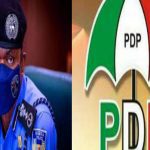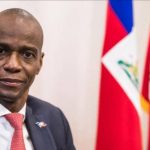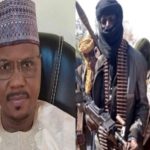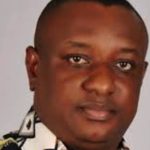An Ecuadorian presidential contender Fernando Villavicencio, known for speaking out against drug cartels and corruption was shot and killed at a political event in the capital on Wednesday, amid a shocking spate of gang-related violence in the South American country.
President Guillermo Lasso acknowledged Fernando Villavicencio’s assassination and suggested organized crime was responsible, less than two weeks before the Aug. 20 presidential election.
According to Ecuador’s attorney general’s office, one suspect died in jail from wounds sustained in a shootout following the homicide, while police captured six suspects following raids in Quito.
Villavicencio told a raucous gathering in his final speech before being assassinated that he would root out corruption and imprison the country’s thieves.
Prior to the shooting, Villavicencio claimed he had received many death threats, including from members of Mexico’s Sinaloa Cartel, one of a myriad of international organized crime gangs operating in Ecuador. He claimed that his campaign posed a threat to such organisations.
Villavicencio was one of eight candidates, but he was not the favorite. The 59-year-old politician was a candidate for the Build Ecuador Movement.
Ecuadorians have witnessed unprecedented violence as drug traffickers have begun to use the country’s coastal ports. Gunfire can be heard in several large cities as competing gangs fight for power, and gangs have recruited minors.
Last month, the mayor of the port city of Manta was assassinated. In an effort to quell the violence, Lasso proclaimed a state of emergency spanning two regions and the country’s jail system on July 26.
In a news conference following Wednesday’s killing, former Vice President and candidate Otto Sonnenholzner remarked, “We are dying, drowning in a sea of tears, and we do not deserve to live like this.
An Ecuadorian presidential contender Fernando Villavicencio, known for speaking out against drug cartels and corruption was shot and killed at a political event in the capital on Wednesday, amid a shocking spate of gang-related violence in the South American country.
President Guillermo Lasso acknowledged Fernando Villavicencio’s assassination and suggested organized crime was responsible, less than two weeks before the Aug. 20 presidential election.
According to Ecuador’s attorney general’s office, one suspect died in jail from wounds sustained in a shootout following the homicide, while police captured six suspects following raids in Quito.
Villavicencio told a raucous gathering in his final speech before being assassinated that he would root out corruption and imprison the country’s thieves.
Prior to the shooting, Villavicencio claimed he had received many death threats, including from members of Mexico’s Sinaloa Cartel, one of a myriad of international organized crime gangs operating in Ecuador. He claimed that his campaign posed a threat to such organisations.
Villavicencio was one of eight candidates, but he was not the favorite. The 59-year-old politician was a candidate for the Build Ecuador Movement.
Ecuadorians have witnessed unprecedented violence as drug traffickers have begun to use the country’s coastal ports. Gunfire can be heard in several large cities as competing gangs fight for power, and gangs have recruited minors.
Last month, the mayor of the port city of Manta was assassinated. In an effort to quell the violence, Lasso proclaimed a state of emergency spanning two regions and the country’s jail system on July 26.
In a news conference following Wednesday’s killing, former Vice President and candidate Otto Sonnenholzner remarked, “We are dying, drowning in a sea of tears, and we do not deserve to live like this.
An Ecuadorian presidential contender Fernando Villavicencio, known for speaking out against drug cartels and corruption was shot and killed at a political event in the capital on Wednesday, amid a shocking spate of gang-related violence in the South American country.
President Guillermo Lasso acknowledged Fernando Villavicencio’s assassination and suggested organized crime was responsible, less than two weeks before the Aug. 20 presidential election.
According to Ecuador’s attorney general’s office, one suspect died in jail from wounds sustained in a shootout following the homicide, while police captured six suspects following raids in Quito.
Villavicencio told a raucous gathering in his final speech before being assassinated that he would root out corruption and imprison the country’s thieves.
Prior to the shooting, Villavicencio claimed he had received many death threats, including from members of Mexico’s Sinaloa Cartel, one of a myriad of international organized crime gangs operating in Ecuador. He claimed that his campaign posed a threat to such organisations.
Villavicencio was one of eight candidates, but he was not the favorite. The 59-year-old politician was a candidate for the Build Ecuador Movement.
Ecuadorians have witnessed unprecedented violence as drug traffickers have begun to use the country’s coastal ports. Gunfire can be heard in several large cities as competing gangs fight for power, and gangs have recruited minors.
Last month, the mayor of the port city of Manta was assassinated. In an effort to quell the violence, Lasso proclaimed a state of emergency spanning two regions and the country’s jail system on July 26.
In a news conference following Wednesday’s killing, former Vice President and candidate Otto Sonnenholzner remarked, “We are dying, drowning in a sea of tears, and we do not deserve to live like this.
An Ecuadorian presidential contender Fernando Villavicencio, known for speaking out against drug cartels and corruption was shot and killed at a political event in the capital on Wednesday, amid a shocking spate of gang-related violence in the South American country.
President Guillermo Lasso acknowledged Fernando Villavicencio’s assassination and suggested organized crime was responsible, less than two weeks before the Aug. 20 presidential election.
According to Ecuador’s attorney general’s office, one suspect died in jail from wounds sustained in a shootout following the homicide, while police captured six suspects following raids in Quito.
Villavicencio told a raucous gathering in his final speech before being assassinated that he would root out corruption and imprison the country’s thieves.
Prior to the shooting, Villavicencio claimed he had received many death threats, including from members of Mexico’s Sinaloa Cartel, one of a myriad of international organized crime gangs operating in Ecuador. He claimed that his campaign posed a threat to such organisations.
Villavicencio was one of eight candidates, but he was not the favorite. The 59-year-old politician was a candidate for the Build Ecuador Movement.
Ecuadorians have witnessed unprecedented violence as drug traffickers have begun to use the country’s coastal ports. Gunfire can be heard in several large cities as competing gangs fight for power, and gangs have recruited minors.
Last month, the mayor of the port city of Manta was assassinated. In an effort to quell the violence, Lasso proclaimed a state of emergency spanning two regions and the country’s jail system on July 26.
In a news conference following Wednesday’s killing, former Vice President and candidate Otto Sonnenholzner remarked, “We are dying, drowning in a sea of tears, and we do not deserve to live like this.
An Ecuadorian presidential contender Fernando Villavicencio, known for speaking out against drug cartels and corruption was shot and killed at a political event in the capital on Wednesday, amid a shocking spate of gang-related violence in the South American country.
President Guillermo Lasso acknowledged Fernando Villavicencio’s assassination and suggested organized crime was responsible, less than two weeks before the Aug. 20 presidential election.
According to Ecuador’s attorney general’s office, one suspect died in jail from wounds sustained in a shootout following the homicide, while police captured six suspects following raids in Quito.
Villavicencio told a raucous gathering in his final speech before being assassinated that he would root out corruption and imprison the country’s thieves.
Prior to the shooting, Villavicencio claimed he had received many death threats, including from members of Mexico’s Sinaloa Cartel, one of a myriad of international organized crime gangs operating in Ecuador. He claimed that his campaign posed a threat to such organisations.
Villavicencio was one of eight candidates, but he was not the favorite. The 59-year-old politician was a candidate for the Build Ecuador Movement.
Ecuadorians have witnessed unprecedented violence as drug traffickers have begun to use the country’s coastal ports. Gunfire can be heard in several large cities as competing gangs fight for power, and gangs have recruited minors.
Last month, the mayor of the port city of Manta was assassinated. In an effort to quell the violence, Lasso proclaimed a state of emergency spanning two regions and the country’s jail system on July 26.
In a news conference following Wednesday’s killing, former Vice President and candidate Otto Sonnenholzner remarked, “We are dying, drowning in a sea of tears, and we do not deserve to live like this.
An Ecuadorian presidential contender Fernando Villavicencio, known for speaking out against drug cartels and corruption was shot and killed at a political event in the capital on Wednesday, amid a shocking spate of gang-related violence in the South American country.
President Guillermo Lasso acknowledged Fernando Villavicencio’s assassination and suggested organized crime was responsible, less than two weeks before the Aug. 20 presidential election.
According to Ecuador’s attorney general’s office, one suspect died in jail from wounds sustained in a shootout following the homicide, while police captured six suspects following raids in Quito.
Villavicencio told a raucous gathering in his final speech before being assassinated that he would root out corruption and imprison the country’s thieves.
Prior to the shooting, Villavicencio claimed he had received many death threats, including from members of Mexico’s Sinaloa Cartel, one of a myriad of international organized crime gangs operating in Ecuador. He claimed that his campaign posed a threat to such organisations.
Villavicencio was one of eight candidates, but he was not the favorite. The 59-year-old politician was a candidate for the Build Ecuador Movement.
Ecuadorians have witnessed unprecedented violence as drug traffickers have begun to use the country’s coastal ports. Gunfire can be heard in several large cities as competing gangs fight for power, and gangs have recruited minors.
Last month, the mayor of the port city of Manta was assassinated. In an effort to quell the violence, Lasso proclaimed a state of emergency spanning two regions and the country’s jail system on July 26.
In a news conference following Wednesday’s killing, former Vice President and candidate Otto Sonnenholzner remarked, “We are dying, drowning in a sea of tears, and we do not deserve to live like this.
An Ecuadorian presidential contender Fernando Villavicencio, known for speaking out against drug cartels and corruption was shot and killed at a political event in the capital on Wednesday, amid a shocking spate of gang-related violence in the South American country.
President Guillermo Lasso acknowledged Fernando Villavicencio’s assassination and suggested organized crime was responsible, less than two weeks before the Aug. 20 presidential election.
According to Ecuador’s attorney general’s office, one suspect died in jail from wounds sustained in a shootout following the homicide, while police captured six suspects following raids in Quito.
Villavicencio told a raucous gathering in his final speech before being assassinated that he would root out corruption and imprison the country’s thieves.
Prior to the shooting, Villavicencio claimed he had received many death threats, including from members of Mexico’s Sinaloa Cartel, one of a myriad of international organized crime gangs operating in Ecuador. He claimed that his campaign posed a threat to such organisations.
Villavicencio was one of eight candidates, but he was not the favorite. The 59-year-old politician was a candidate for the Build Ecuador Movement.
Ecuadorians have witnessed unprecedented violence as drug traffickers have begun to use the country’s coastal ports. Gunfire can be heard in several large cities as competing gangs fight for power, and gangs have recruited minors.
Last month, the mayor of the port city of Manta was assassinated. In an effort to quell the violence, Lasso proclaimed a state of emergency spanning two regions and the country’s jail system on July 26.
In a news conference following Wednesday’s killing, former Vice President and candidate Otto Sonnenholzner remarked, “We are dying, drowning in a sea of tears, and we do not deserve to live like this.
An Ecuadorian presidential contender Fernando Villavicencio, known for speaking out against drug cartels and corruption was shot and killed at a political event in the capital on Wednesday, amid a shocking spate of gang-related violence in the South American country.
President Guillermo Lasso acknowledged Fernando Villavicencio’s assassination and suggested organized crime was responsible, less than two weeks before the Aug. 20 presidential election.
According to Ecuador’s attorney general’s office, one suspect died in jail from wounds sustained in a shootout following the homicide, while police captured six suspects following raids in Quito.
Villavicencio told a raucous gathering in his final speech before being assassinated that he would root out corruption and imprison the country’s thieves.
Prior to the shooting, Villavicencio claimed he had received many death threats, including from members of Mexico’s Sinaloa Cartel, one of a myriad of international organized crime gangs operating in Ecuador. He claimed that his campaign posed a threat to such organisations.
Villavicencio was one of eight candidates, but he was not the favorite. The 59-year-old politician was a candidate for the Build Ecuador Movement.
Ecuadorians have witnessed unprecedented violence as drug traffickers have begun to use the country’s coastal ports. Gunfire can be heard in several large cities as competing gangs fight for power, and gangs have recruited minors.
Last month, the mayor of the port city of Manta was assassinated. In an effort to quell the violence, Lasso proclaimed a state of emergency spanning two regions and the country’s jail system on July 26.
In a news conference following Wednesday’s killing, former Vice President and candidate Otto Sonnenholzner remarked, “We are dying, drowning in a sea of tears, and we do not deserve to live like this.














